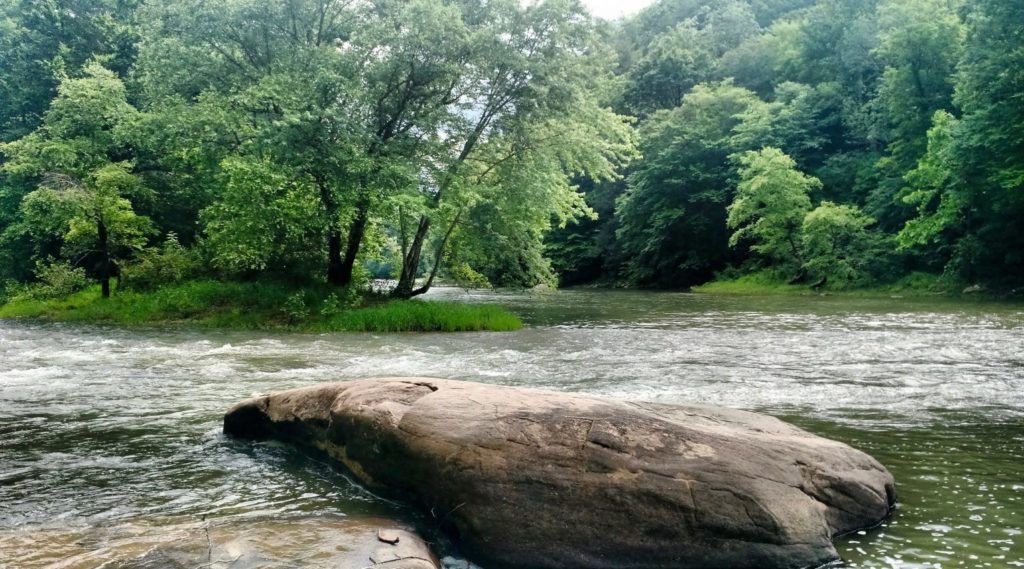Opinion: Anxiety, Disruptive Protest, And Climate Action

Greenbriar River in Lewisburg, West Virginia. Photo: Amy Vernon-Jones.
Love Justice and Climate Change

A great many people are anxious about the climate. Some are living under a cloud of despair. Some are worried occasionally. Some are mostly trying to avoid thinking about it too often. Most of us are aware that there’s a serious problem and that efforts to address it are moving too slowly.
Feelings About Climate Are Negatively Affecting Young People’s Lives
A global study of “climate anxiety in children and young people” published in December 2021 found widespread worry about the climate. The researchers surveyed 10,000 respondents, ages 16 -25, in 10 different countries. 56% of respondents said that “humanity is doomed” and more than 45% said their feelings about climate change “negatively affected their daily life and functioning.” More respondents from poorer countries such as Brazil, India, and the Philippines reported negative impacts from worry about the climate, but anxiety was high across all countries studied, including the U.K., France, and the U.S.
Welcome Whatever You Are Feeling
The New York Times recently featured an opinion piece on climate anxiety by PhD psychologist and activist Margaret Klein Salamon. She held “climate emotion conversations” with hundreds of people and found that participants often spoke of “grief, terror, rage, shock, betrayal, guilt and alienation.” She says, “While painful, these emotions are healthy” and are part of developing an appropriate response to the climate crisis. She encourages us to welcome these feelings with “curiosity, respect and compassion for ourselves “
Four Key Steps
In earlier writings Salamon has recommended that we 1) face climate truth; 2) welcome fear, grief, and other painful feelings, and “get comfortable with crying;” 3) understand and enter “emergency mode;” and 4) join the “climate emergency movement.” Her recommendations and my posts “Climate Anxiety and Having a Good Life” and “Feelings,” have many elements in common.
Collective Action Is A Uniquely Effective Antidote To Despair
In the recent New York Times piece, Salamon encourages people to pour their painful emotions about the climate crisis into protest and non-violent direct action. She writes, “My psychological training and years in the movement have shown me that this kind of collective action is a uniquely effective antidote to despair.”
Disruptive Protest And Non-Violent Direct Action
She declares that both history and social science indicate that “disruptive protest and non-violent direct action … are the fastest path to transformative change.” How does she make that claim? First, she notes that in 2019 after the activist group Extinction Rebellion repeatedly shut down parts of London with weeks of protest and civil disobedience, the UK government declared a climate emergency and became the first major economy to legally commit to being net-zero by 2050.
Peaceful Marches And Civil Disobedience Both Raise Public Support For Climate Action
Secondly, she references a recent study (reported in the Yale Environmental Review) of the effects of three types of protest: peaceful marches, civil disobedience, and violent protests. This study found that in the U.S. peaceful marches and civil disobedience are both effective in raising public support for climate action (and that neither has the sometimes feared effect of alienating potential supporters). Also data analysts at Giving Green have calculated that donations to activist groups engaged in civic resistance are three times more effective in preventing emissions than those to top-performing insider advocacy organizations.
More Support For Non-Violent Civil Disobedience
A survey by the Yale Program on Climate Change Communication found that roughly a quarter of white respondents and a third of Black and Latinex respondents said they would support organizations engaging in non-violent civil disobedience against corporate or government activities that make global warming worse. Among those who are “alarmed” about climate change, 10% said they “definitely would” and another 18% said they “probably would”” participate in non-violent civil disobedience if asked by someone they respected. Nationally that indicates millions of people are willing to engage in non-violent civil disobedience in support of action on global warming.
A Role For Everyone
I know some of my friends have told me that they respect my engaging in civil disobedience for climate action, but that it’s not for them. However, any direct action event requires some who are willing to risk arrest, and many more who play support roles: handing out leaflets to spectators, holding personal items for arrestees, displaying signs and banners, cheering, etc. If you don’t feel ready to risk arrest, you could still, like a few of my friends, be part of a non-violent direct action in a support role.
Climate Emergency Fund
Salamon is now the executive director of Climate Emergency Fund (CEF), which raises funds and supports activist groups that are organizing mass protest and non-violent civil resistance. They have vetted and funded 33 groups in over 25 nations. They funded the Scientist Rebellion, which includes over 1,000 scientists, in 25 countries, who have decided civil disobedience is necessary and have engaged in actions including chaining themselves to bank buildings and to the White House fence, and putting paint the color of blood on the Spanish Parliament building. They’ve funded Extinction Rebellion, whose activists recently shut down a main square in central Paris, urging voters to think about ecological and social justice as they headed to the polls.
Finding A Sense Of Purpose And Community
Whether you decide to disrupt, to support other disrupters, or to simply join a march or rally – your action will lead to better climate policies and be a tonic for whatever climate anxiety you feel. As Salamon says, “Joining a movement allows us to live for a purpose greater than ourselves, and a collective benefit of a national climate mobilization would be improved mental health. Instead of despair and alienation, we can find a sense of purpose and community in the face of the climate crisis.”
Russ Vernon-Jones was principal of Fort River School 1990-2008 and is currently a member of the Amherst Community Safety Working Group and of the Steering Committee of Climate Action Now-Western Massachusetts. He blogs regularly on climate justice at www.russvernonjones.org.
